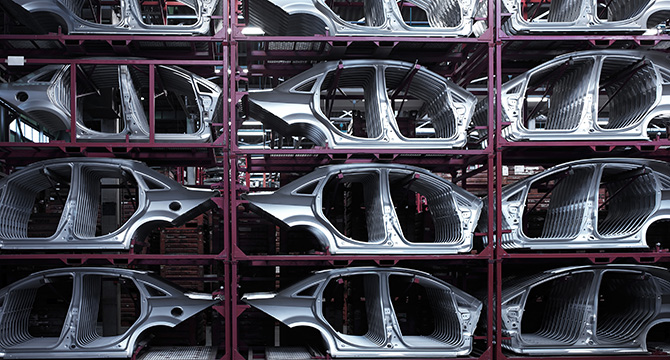Automotive Industry Forum Preview: As the Auto Industry Transforms, It Grapples with Issues of Cybersecurity, IP & Connectivity

By guest author Gregg Wirth of the Legal Executive Institute.
The American automotive industry in no longer making your father’s Oldsmobile — not by a long shot.
Today, pushed by evolving consumer behaviors, transformative technologies, and global market pressures, the automobile industry has entered a new industrial revolution where ingenuity and opportunity coalesce, and the tools of the trade include adaptive cruise control, autonomous vehicles, and nanocellulose and cellular V2X technologies.
On October 4, the Thomson Reuters Legal Executive Institute will present a summit — Concordant Crossroads: Regulation and Innovation in the Automotive Industry — on the influential forces shaping commerce and compliance across all corridors of one of the world’s fastest growing business sectors. The afternoon event will be held at Thomson Reuters’ New York offices at 3 Times Square.
Steve Hilfinger, a partner with Foley & Lardner and co-chair of the event, said the growing interest in what’s happening with automotive and other mobility technology has attracted the attention of many industry players, software companies, connectivity developers, and other groups.
Hilfinger will moderate a panel at the event to discuss evolving trends in the industry, with fellow Foley partners Pavan Agarwal and Christopher Swift; Kimberly Y. Chainey, associate general counsel in Global M&A, Strategy and Innovation at Avis Budget Group; and Ellen Clark, managing director at Greenwich Capital Group.
The panel will examine several industry trends, such as the global M&A environment and industry-wide joint ventures, as legacy and nascent players jockey for position in the automotive industry of the future, while at the same time, Hilfinger stresses, striving for profitability, sustainability and growth in today’s market while bracing for the next down cycle.
“All these players have sort of common goals right now,” Hilfinger says. “They want to acquire technology, they want to acquire talent, and they want to be part of the group that sets the industry standards that will be commercially adopted.” They fear, he adds, being on the wrong side of history or technology.
That means, he explains, these parties are going to look at ways to share costs and develop talent because there’s a major cost element to developing the kind of technology that the automotive industry is going to need going forward, leading to different models to share costs and utilize talent.
“In some cases, it’s straight M&A transactions, or you’re seeing a lot more companies deploying corporate venture capital, either through their own departments or with separate funds, to invest in this new technology,” Hilfinger explains, adding that you’re even seeing joint-development activity and collaborations across industries and among players at different tiers of the automotive supply chain. “Having [original equipment manufacturers] OEMs and suppliers involved together is definitely different than the traditional supply-chain contracting structure that historically has permeated the automotive space.”
Concurrent with the avid interest and rapid technological development in the automotive industry, especially around the development of autonomous vehicles, concern has grown around issues of security, data protection, and IP, as well as government regulation and compliance with what could potentially be fleets of driverless cars and trucks on our roads in the not-too-distant future.
Two other panels at the event will deal deftly with these issues. In the first, event co-chair Neal Walters, a partner and practice leader in the Product Liability & Mass Tort Group at Ballard Spahr, will lead a panel looking into the legal issues surrounding autonomous vehicles, including regulatory scrutiny, liability considerations, and class action litigation concerns. Panelists include Thomas Branigan, managing partner at Bowman and Brook; Bryan Casey, CodeX fellow at the Stanford Law School; Nandi Chhabra, legal counsel and market development manager at Peloton Technology; and Christopher H. Grigorian, partner at Foley & Lardner.
In the following panel, Philip N. Yannella, partner and co-practice leader in the Privacy & Data Security Group, and practice leader in the E-Discovery & Data Management Group at Ballard Spahr, will lead a panel discussion of the cybersecurity and data privacy issues inherent in tomorrow’s hyper-connected cars. Yannella, also event co-chair, is joined by panelists Ryan Bowers, counsel in Global Privacy & Cybersecurity with General Motors; Jennifer A. Dukarski, shareholder at Butzel Long; James Mostofi, global head of business development at American International Group; and Michael Shapland, senior counsel in Transactions & Compliance at Nissan Group of North America.
Taken as a whole, Hilfinger says the event goes far to address the essential three liability and regulatory questions that really need to be explored — cybersecurity and data privacy, IP and compliance issues, and industry collaborations.
Hilfinger says that while many practitioners have a working understanding of these issues, this event will allow for a deep drill-down on these topics. “Event attendees should walk away with a little more appreciation and a little more depth of understanding of these critical issues,” he says, adding that this will be especially important if attendees have clients that are either in this space or maybe impacted by these issues.
“Attendees will be able to make more connections and take away ideas about how these issues might impact their own client’s product development strategies or how all this fits into their client’s business plan,” he says. “Hopefully, it’ll help them be better counselors to either their own company if they’re in-house or with their own clients if they’re outside.”